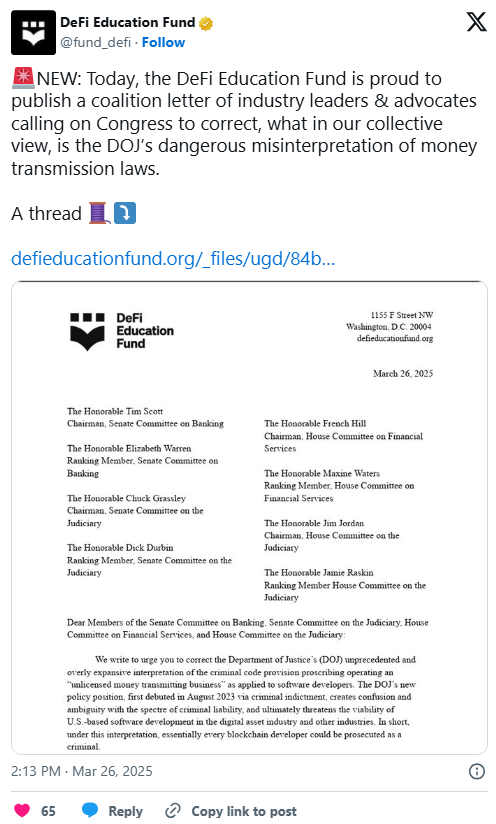Over 30 crypto companies and foundations have requested Congress to ask the U.S. Department of Justice to clarify a key enforcement issue.
DeFi Education Fund and Top Crypto Companies Criticize DOJ's Overinterpretation of Fund Transfer Regulations
The DeFi Education Fund and several leading crypto companies criticized the U.S. Department of Justice's (DOJ) "unprecedented and overly expansive" interpretation of criminal law, which has been used to classify crypto companies as illegal money transfer institutions.
In a letter signed and submitted today to the leadership of the House and Senate Banking Committees, Judiciary Committees, and House Financial Services Committee, the DeFi Education Fund stated that the DOJ's position, first proposed in 2023, "threatens the feasibility of software development in the U.S. digital asset industry and other sectors".
The letter was co-signed by 34 crypto industry companies, foundations, and associations, including crypto exchanges Coinbase, Kraken, and Crypto.com, venture capital firms Andreessen Horowitz, Paradigm, and Dragonfly. Additionally, signatories included prominent crypto enterprises such as Uniswap Labs, Polygon Labs, and ConsenSys (one of Decrypt's 22 independent investors).

DeFi Education Fund: Primary Goal to Prompt Congressional Clarification of Section 1960
Amanda Tuminelli, Executive Director and Chief Legal Officer of the DeFi Education Fund (DEF), told Decrypt: "The DeFi Education Fund's primary policy objective is to push Congress to clarify Section 1960." She noted that the DOJ is abusing this regulation by implementing regulation through criminal charges, or so-called "criminalization of regulation".
Currently, a typical case of the DOJ's enforcement using the definition of "money transmitter" is the prosecution of Tornado Cash co-founder Roman Storm, who was arrested on suspicion of money laundering.
In this case, the DOJ emphasized that Tornado Cash was used by state-sponsored hackers for illegal fund transfers, viewing it as a security threat. Crypto advocates (like DEF) support Storm, believing the code he wrote is protected by free speech. However, Judge Katherine Polk Failla ruled that the case would proceed, as Storm's charges comply with relevant legal provisions.
Judge Failla: Law Targets Illegal Fund Flows, Not Protected Speech
Judge Katherine Polk Failla stated in her ruling that the law Storm is accused of violating "is not aimed at protected expression" but is used to "punish money laundering, operating unlicensed money transmission businesses, and circumventing sanctions".
The DeFi Education Fund (DEF) noted in its letter to Congress that Section 1960 is one of two key provisions defining "Money Transmitting Business" in U.S. law, primarily used as an enforcement mechanism to criminally prosecute unlicensed money transfer institutions. DEF also stated that Section 5330 contains a definition of "who should be considered a money transmission business", which is "substantially the same" as Section 1960.
"Despite the intentional consistency in the definition of 'money transmission business' in Sections 5330 and 1960, and the clear guidance issued by FinCEN in 2019, the DOJ still insists that the definition of 'money transmission business' under the Bank Secrecy Act (BSA) is unrelated to determining whether someone has violated Section 1960 by operating an unlicensed money transmission business," DEF wrote in the letter.
Furthermore, DEF pointed out: "To date, no criminal court has supported or acknowledged the DOJ's novel interpretation in its analysis of Section 1960."
DeFi Education Fund: DOJ's Interpretation May Threaten U.S. Non-Custodial Technology Developers
The DeFi Education Fund (DEF) warned that if the DOJ's deviation from the established legal framework in defining "money transmission" is not addressed, it could expose U.S. non-custodial technology software developers to legal risks.
During the Trump administration, the relationship between the crypto industry and regulators had made significant progress, reflected in the SEC closing multiple investigations and lawsuits and advancing stablecoin regulatory frameworks.
However, pushing the DOJ to provide a clear explanation of Section 1960 remains a key challenge.
"We have seen incredible progress, and the entire industry is moving towards 'long-term stable victory'. Our priority is to ensure long-term legal protection for software developers in DeFi, crypto, AI, and other fields," a DeFi Education Fund spokesperson told Decrypt. "We believe that clarifying Congress's legislative intent in Section 1960 is in the best interest of software developers."
Earlier this year, non-custodial software developer Pharos sued the DOJ, alleging that its overinterpretation of Section 1960 has led to the criminalization of crypto development.







